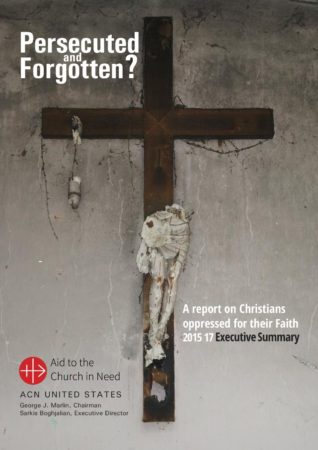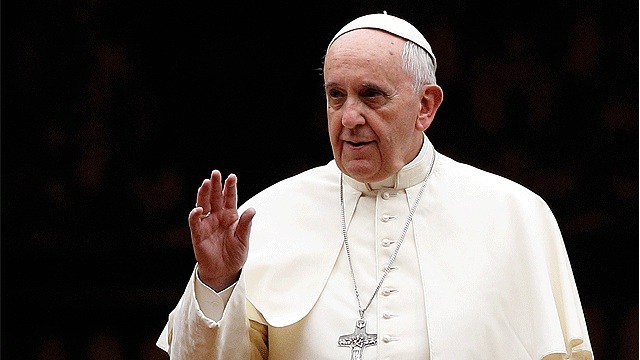
Thirty-four countries around the world continue to severely restrict the right of people to live in accord with their faith says a new report from the European Parliament.
The Parliament’s Intergroup on Freedom of Religion or Belief and Religious Tolerance presented its annual report yesterday and called for a strengthening of the mandate of the EU Special Envoy for Freedom of Religion outside the European Union.
The report says that much of the world’s population is deprived of their right to freedom of religion or belief, thought or conscience. Among the many examples of the persecuted communities throughout the world, it says Rohingya Muslims continue to be persecuted in Myanmar, Christians continue to be sentenced to death for blasphemy in Pakistan, Atheists continue to be demonised and non-Hindu’s are step-by-step deprived of their rights in India.
Persecution is also widespread in countries such as China, Vietnam and North Korea.

Ireland’s marriage rate fell slightly in the first quarter of 2018 from 2.9 per 1,000 (3,459) to 2.8 per 1,000 (3,351), according to the latest vital statistics from the CSO. The number of same-sex marriages fell sharply. There were 106 such marriages in the first three months of 2018 compared to 130 during the same period in 2017 and 186 in the same period in 2016, which was the first full year after the passage of same-sex marriage in 2015.
Population growth also continued to slow in the first quarter of this year due to a significant fall in the birth rate. There were 15,659 births in the first three months of 2018, a 5 per cent decrease on the same period last year. Ireland’s birth rate currently stands at 13.1 per 1,000 population, a decrease of 0.8 from the first quarter of 2017. There were 5,919 births registered outside of marriage, accounting for 37.8 per cent of all births in the quarter. The lowest rate of such births was in Dún Laoghaire-Rathdown at 23.4 per cent.

About 1,000 orders for sperm samples have been made by private Irish individuals from one single sperm bank in the past decade, Cryos in Denmark. Another 4,000 were ordered through clinics.
Cryos International chief executive Peter Reeslev declined to reveal the exact number of orders placed by private and corporate individuals, but added that about 80 per cent of Irish sperm orders were supplied to clinics while the remaining 20 per cent were issued to private individuals.
He added that there had been a dramatic shift in customer groups in the past 10 years, while the number of orders placed had stayed relatively stable. He said private heterosexual couples from Ireland now make up just 20 per cent of purchasers, while singles (40 per cent) and lesbians (40 per cent) now account for the vast majority of private orders.
He also said there has been a shift away from anonymous sperm to samples where the male provider was identified. While he speculated this may be due to an anticipated change in the law to ban the exchange of anonymous sperm and eggs, it may also be due to a rising awareness of the wrong inflicted on donor-conceived children by the enforced loss of their genetic identity.
According to another outlet, the European Sperm Bank, personal orders by Irish patients numbered around 100 in 2017 and order numbers are increasing in 2018. About 20 per cent of the sperm delivered to Ireland last year was anonymous, while 80 per cent was non-anonymous, their spokeswoman said.

Health Minister Simon Harris has given his public backing to parents protesting enrolment policies designed to protect the ethos of a Church of Ireland school. The Minister for Health made his intervention on Friday as the school in Greystones is located in his constituency.
Minister Harris said many parents in the town contacted him who were very upset about the admissions policies at St Patrick’s primary school. He was referring to a policy of giving enrolment priority to children whose families are active members of the local COI parish. The protestors say the policy is new; the board of management say it has been in place for some time. Mr Harris said he intends to write to the Department of Education as he “does not believe these changes are in line with, at the very least, the spirit and intention of recent legislation”. That legislation prohibited Catholic schools from using parish involvement as a factor in enrolment, but it does allow minority Christian denominations and minority faiths to do so as a means of protecting their characteristic ethos.
Over the weekend, the Church of Ireland Archbishop of Dublin weighed in on the matter in support of the board of management. He refused to dissolve the board despite the protests by parents. In a statement, Archbishop Jackson – the school’s patron – acknowledged that while St Patrick’s was facing challenging times, there was no evidence that the board was “dysfunctional”.
“In this instance, while the patron is aware that there are many different points of view, he has not been provided with any information that would indicate that the functions of the board of management are not currently being effectively discharged”. He added: “The Church of Ireland ethos of the school and decisions made by the board of management in the past remain unchanged. The board of management will continue to manage the school and the school will continue to educate the children entrusted to its care.”

A study has found that a natural fertility technique called ‘restorative reproductive medicine’ (RRM) has a success rate among the group of women sampled of over 50pc. Unlike IVF, the technique does not involve the destruction of human embryos.
The study said 74 out of 128 women who completed RRM at Neo-Fertility, a treatment clinic based in Dublin, gave birth to full-term healthy babies after two or more failed IVF treatments. The study had 403 participants but 275 dropped out before the two-year RRM treatment was complete. The average age of female participants was 37. RRM is a scientific approach that seeks to co-operate with or restore the normal physiology and anatomy of the human reproductive system. It does not use artificial insemination or approaches that seek to make a baby in vitro, or outside the body, and neither does it involve the creation, freezing or destruction of multiple embryos. Instead it seeks to address directly problems such as endometriosis, polycystic ovaries and fibroids so that fertilisation may then occur through natural means.
Dr Phil Boyle, medical director of Neo Fertility and lead researcher on the study, said it offered “fresh hope” for older women with fertility problems. He said that the cost of most RRM treatments was about €1,650, which is a third of the cost of one IVF treatment.

Catholic Bishops in Australia have adamantly rejected a call to break the seal of the confessional in cases where penitents have admitted child sexual abuse. They were responding to Australia’s Royal Commission into Institutional Responses to Child Sexual Abuse and announced they will comply with 98 percent of the Commission’s recommendations, but on removing the seal of the confessional, their report labeled the suggestion as “inimical to religious liberty,” not just for the Catholic Church but for other religions as well.
The bishops indicated a willingness to consider changing the Church’s requirement of priestly celibacy, and to amend canon law to remove the requirement for destroying documents after a cleric has died or following ten years after a sentencing.
On priestly celibacy, the Bishops’report noted that “the Royal Commission made no finding of a causal connection between celibacy and child sexual abuse,” though it added that “voluntary celibacy is a long- established and positive practice of the Church in both East and West, particularly for bishops and religious life.”
“Inadequate initial and continuing formation of priests and religious for celibate living may have contributed to a heightened risk of child sexual abuse, but not celibacy as a state of life in and of itself,” it continued.

Parents at a Church of Ireland primary school have overwhelmingly backed a no-confidence vote in its board of management over a policy of prioritising the enrolment of children who regularly attend church services. Such a policy is commonplace in Britain to stop parents who are not active parish members queue-jumping those who are.
Controversy erupted during the summer when principal Eileen Jackson wrote to parents to state that she was resigning on foot of the school’s “new direction” in making admission to State-funded education a “collateral benefit of parochial engagement”. These priority admissions require the signature of the rector, who signs off whether the child is an active member of the parish. Board of management sources, however, say there is “no change in direction” and its policy has been in place for several years.
Many parents said Wednesday night’s vote sent a “strong message” to the board and patron. “Parents and teachers are not happy at the direction our school is going in. They have lost our trust and confidence.”
However, one parent, who supports the board, said: “It was like a lynch mob meeting. It’s all orchestrated. I was being shouted at being told to look at people when I was talking to them. It was shocking.”
Under new school admission laws, minority faith schools, such as the Church of Ireland, will continue to be permitted to give priority enrolment to children on the basis of religion under new admission laws. However, a department spokesman said schools will not be permitted to rank these students “on the basis of the extent to which the child or his or her family are involved in local religious activities”.

Pope Francis has said that while the Church respects everyone, including the divorced and separated, it must not be forgotten that the ideal is the united family.
Francis stressed this during his weekly General Audience, Wednesday morning, Aug. 29, held in St. Peter’s Square, as he reflected on his recent visit to Ireland for the World Meeting of Families (WMOF) in Dublin. The Pope said the event was prophetic in showcasing families engaged in the Gospel way of marriage and family life. “We forget so many families that go on with faithfulness and courage. We forget it because today it is fashionable to talk about divorces and separations and this is a bad thing. I respect everything, but this is not ideal, the ideal is not separation, but a united family!”
The thousands of families – spouses, grandparents, children – gathered in Dublin, with all the variety of their languages, cultures and experiences, he noted, have been “an eloquent sign of the beauty of God’s dream for the entire human family.” He continued: “In the mystery of his love, He calls families to participate in this dream and make the world a house where nobody is alone, nobody is unwanted, nobody is excluded.”

An unmarried mother has won a landmark UK Supreme Court case which could allow her to claim a Widowed Parent’s Allowance (WPA) even though she was never married. Siobhan McLaughlin from County Antrim, had lived with her partner for 23 years, with whom she had four children, and after his death she was denied money that her children would have been entitled to had she been married. The Supreme Court Justices found that the legislation which governs the WPA was incompatible with human rights law, as it “precludes any entitlement to WPA by a surviving unmarried partner”. The Supreme Court by itself cannot change the law but it puts pressure on the UK’s legislatures to do so to ensure that it is human rights compliant, according to the Court’s understanding of those rights.
Reacting to the news on Thursday, Ms McLaughlin described the judgment as “just surreal”.
“It is just fantastic for all those children that have been recognised now,” she said. “It wasn’t ever about me, it was always to do with the parent’s allowance part of it.” When asked what it meant for people “in her position”, Ms McLaughlin replied: “Hopefully they will recognise that they are just as worthy as children born into wedlock.”

A “worryingly low” number of women are taking up employment, the National Recruitment Federation (NRF) has said. In a pre-budget submission, the representative body for the State’s recruitment industry warned the rapid decline in unemployment poses “significant challenges for the economy”, and the low participation rates of women over the age of 35 – when most women have become mothers – needed to be addressed.
The lobby group argued that the high cost of childcare, and aspects of the social welfare system, were causing women to not go back to work, and that without action, economic progress would suffer as a result. CSO data show that only small minority of couples wish to put their children into daycare.
“Proper investment in a structured childcare solution is needed, and, in terms of the cost of subsidised childcare, this is expenditure that Government can’t afford not to make, if we are to resource our labour market needs and drive economic progress,” said Mr Farrelly.
The lobby group also argued the so-called “granny grant” – an initiative to offer €1,000 to grandparents who help with childcare – is an inadequate response for an issue requiring “serious investment”.